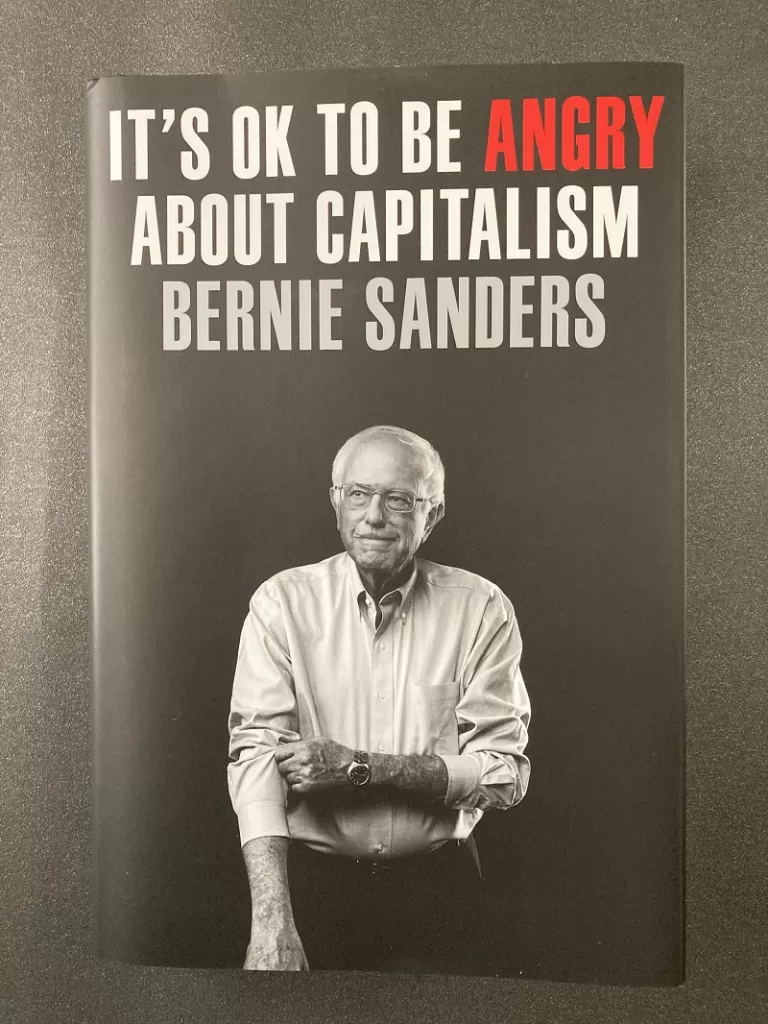
We have all been discouraged from judging a book by examining only its cover. While the idiom typically stands as metaphor suggesting we should not size up new acquaintances too quickly, it also contains the literal prompt to browse a few pages before dismissing out of hand an actual book. As with all bits of enduring wisdom, exceptions to the general rule can be found.
A book titled It’s OK to Be Angry about Capitalism says quite a bit about where this one might go. And, when the cover also reveals that this 2023 publication has been authored by none other than United States Senator Bernie Sanders of Vermont, one could logically assume that we have heard much of this before. If you recall, the feisty self-proclaimed democratic socialist ran for president in 2016 and 2020; so there have been a great many opportunities to hear what’s been on his mind. Of course, since this is what I do, I decided to test the presumption regarding book covers; and must now say that Bernie’s new book reads exactly like you might expect. It also reads like a Bernie Sanders campaign rally.
So, instead of echoing Bernie’s disdain for billionaires and the massive corporations that use their influence to control politicians, I offer a simple summary of what Bernie thinks America should be; a good place to start, don’t you think?
America should be a nation where we properly educate all of our children. America should be a country where the sick and injured are cared for without regard to economic standing. America should be a place where everyone has a roof over their heads and enough food to eat. America should be amenable to those who have come to the end of their working lives. America should be governed by elected representatives whose sole purpose is to represent the interests of We the People, all the people. America should be a leader in promoting global peace, fair trade, international collaboration, and maintaining a habitable planet.
In order to be what we should be, Bernie is simply asking America to do what it has often tried to do; ensuring that our government is in the business of solving human problems. As it turns out, and as his title implies, capitalism is often not very good at doing this.
Before the Progressive Era, which began in 1897, unregulated corporate monopolies polluted the air and water, abused their employees, swallowed up small competitors, and sickened consumers. Corrupt politicians filled their pockets and administered the law in favor of their own interests.
The solution to these institutional problems amounted to a large move away from unfettered capitalism and towards socialism. Corporate monopolies were broken up; labor unions gained strength; measures were taken to protect the environment; our democracy was enhanced through the direct election of US senators and women’s suffrage; muckraking investigative journalists brought political and economic corruption into the light of day; federal legislation was crafted to ensure the safety of food, drugs and water; child labor laws were passed and efforts were made to improve schools; the legal profession was formalized; and more.
While contemporary critics argued that this amounted to government overreach, I’ll venture to say that very few of us today would argue the same.
Perhaps the single most significant evidence that capitalism operates without concern for the human quality of life is the Great Depression of the 1930s. The wildly unregulated stock market collapsed. Banks simply closed their doors after running out of money. Millions lost their jobs and their life savings. People starved while un-harvested crops rotted in the fields.
Serious allegations emerged that capitalism itself was to blame. Unfortunately, those who raised these questions—communists and socialists among them—were decried as un-American.
However, the remedies for a flailing economy became yet another move towards socialism. Under President Franklin Roosevelt’s New Deal, the nation’s banking system was thoroughly reformed; government jobs programs were created to put people back to work; unemployment compensation and Social Security systems were established; a minimum wage law was passed; the right to organize labor unions was further protected; our agricultural infrastructure came under government regulation in order to fight against rural poverty and stabilize farm prices; child labor was banned; fiscal reforms stabilized our currency; the stock market came under government regulation with the establishment of the Securities and Exchange Commission; and more.
World War II changed everything. The mobilization for war was overseen by the federal government, the economy was transformed, and capitalism had almost nothing to do with it. A period of prosperity followed for much of white America while African Americans, long abused by capitalism, stepped up to demand their legal, political, and economic rights.
By the 1960s, John Kennedy’s New Frontier and Lyndon Johnson’s Great Society used government power to fight poverty; public tax dollars financed the space program, which put men on the moon; Medicaid and Medicare programs provided health care for the poor and the elderly; unemployment and minimum wage programs were expanded; small business loans were expanded; veterans benefits were improved; public highway construction accelerated; public tax dollars were directed to assist students with special needs; government incentives were offered to promote the education of doctors, nurses, and other health care professionals; civil and voting rights legislation was passed; federal financial support was offered to universities and colleges to promote research; school lunch programs fed hungry children; welfare laws were improved; housing and urban renewal programs bolstered cities; mass transit programs were supported; the federal government made great strides to support the arts, humanities, and science as directed by the US Constitution; public television and radio were born; consumer protection laws were passed; a whole slew of environmental protection laws were passed; and more.
During the Progressive Era, the New Deal, and LBJ’s Great Society, conservatives vehemently argued that our system of capitalism was being threatened and that the free market should be left on its own to solve America’s problems. Time and again, those critics have been proven wrong.
By the 1980s, the conservative opposition to progressive ideals and programs coalesced under Ronald Reagan, who said in his 1981 inaugural address, “Government is not the solution to our problem, government is the problem.” This sentiment escalated in 1994 with a Republican take-over of the House of Representatives and Newt Gingrich’s Contract with America. In 2016, Reagan’s pronouncement against government birthed a monster who engaged in a scorched-earth approach to long-standing political institutions. And today, as Bernie writes, “much of the Republican Party has descended into right-wing, antidemocratic extremism.”
Modern critics of progressivism—rational conservatives and their evil step-children, the pathologically irrational demagogues lurking on the far right – have often argued that the federal government has failed on many occasions to deliver what has been promised; and they are, in large part, correct. Government programs are often inefficiently administered.
However, their argument for more capitalism—meaning fewer social guarantees, in many cases—is in direct contradiction to what our history has taught us. The real lesson is that so many of the problems we have faced throughout our history have required a centralized approach. And, as Bernie warns, if we are to remain a democracy, this is a role only the government can fulfill.











Great article, Jimmy! I’m not a Bernie Sanders fan per se… and for no apparent reason. So, thanks for the lesson.
I get what you’re saying. How can one be a Bernie Sanders fan without embracing all the baggage that comes from associating with a “democratic socialist” when antagonism to the S-Word has been so successfully weaponized. I think the old guy knows this and just forges ahead with his long-held views regarding the admittedly unrealized potential of government to solve problems.
Peace to you and thanks for piping in,
Jimmy